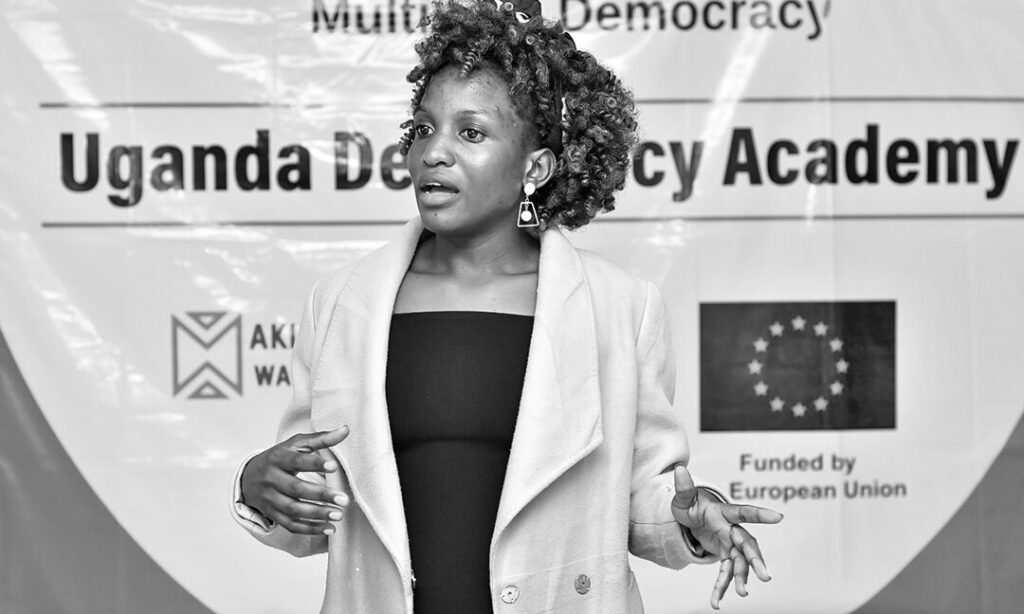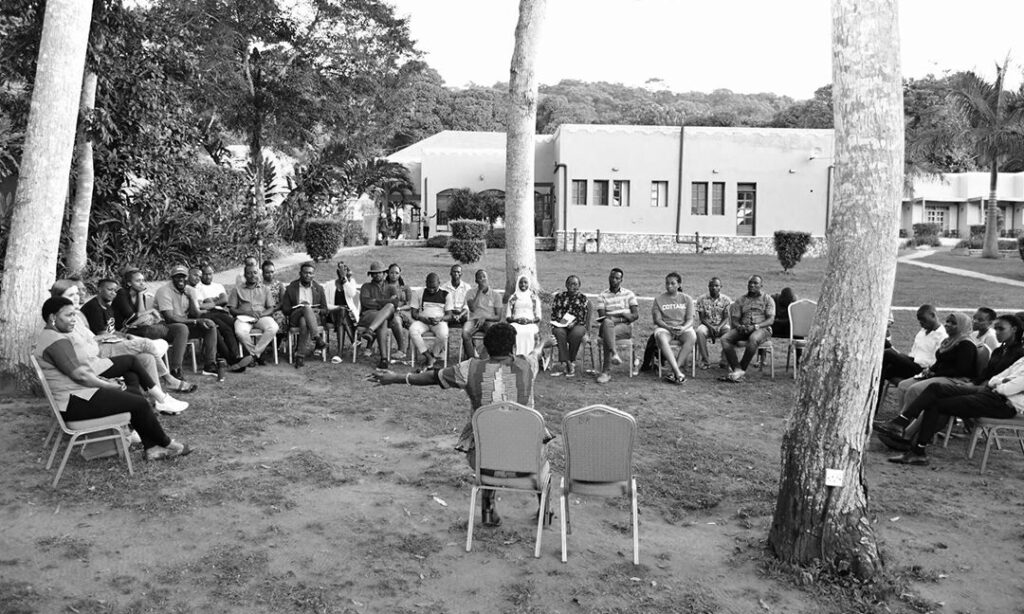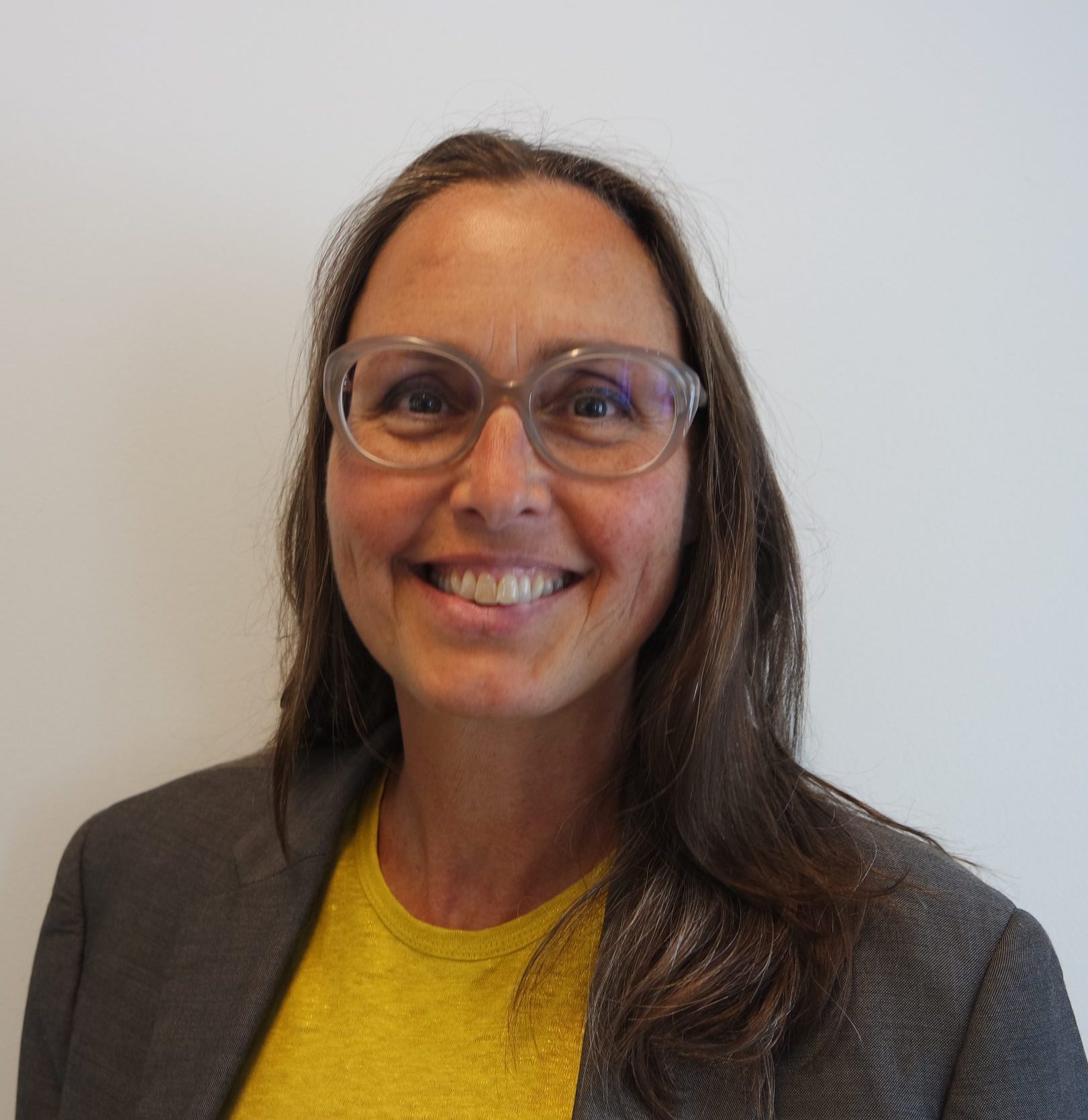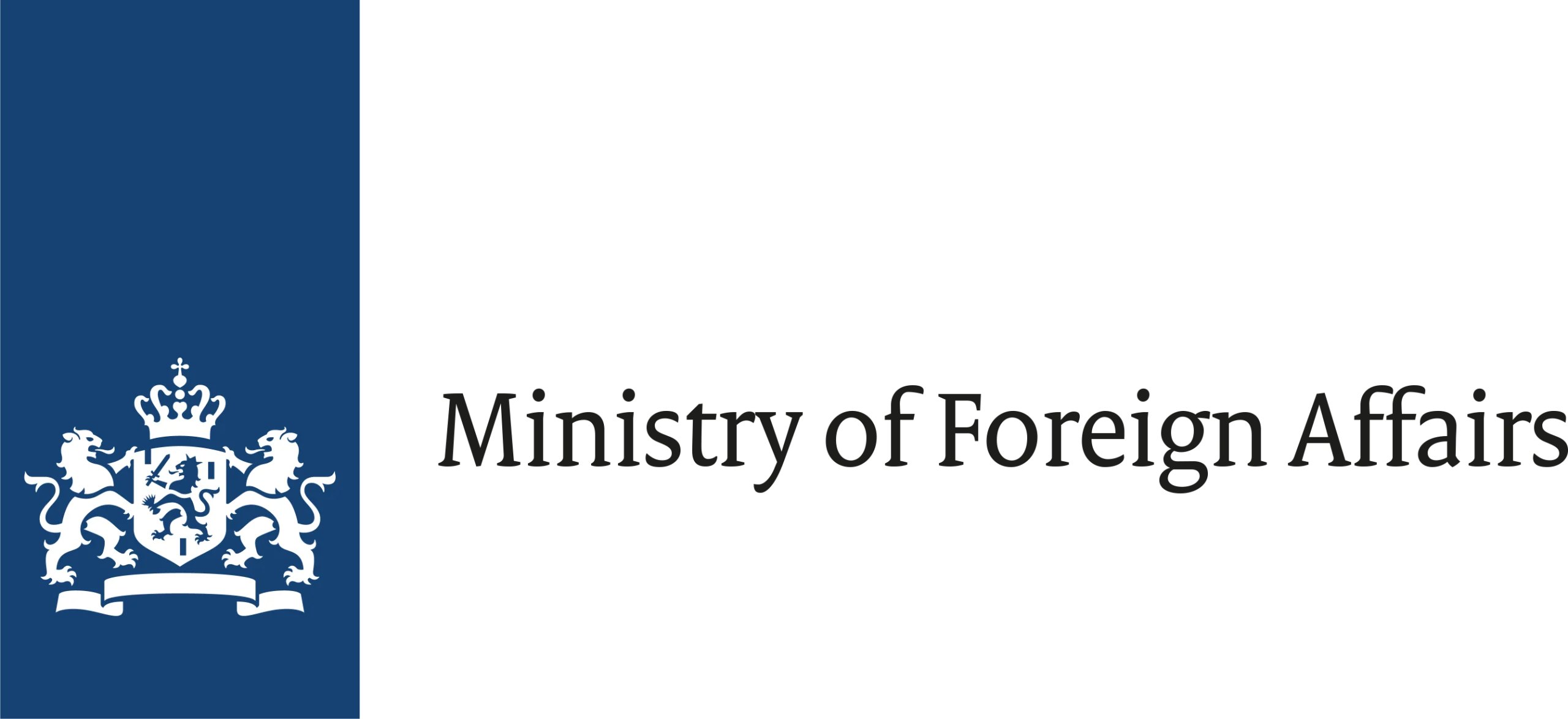Uganda


- NIMD in Uganda: At a glance
- What we do
- How we do it
- Meet the team
Main objective
We bring people together across political and ideological divides to contribute to inclusive political processes through dialogue and enhancing capacities of different political actors, and institutions in order to advance democratic culture, system, and values in Uganda.
Results
Since starting our work in 2009, NIMD Uganda has successfully adapted to the country’s evolving political landscape. From supporting multiparty dialogue to empowering youth through the Uganda Democracy Academy, we have always responded to shifting dynamics with innovative approaches. But our lasting commitment to dialogue and inclusivity means we continue to strengthen Uganda’s democracy in meaningful and lasting ways.
Leaders from NIMD’s Multiparty Youth Forum worked across party and ideological lines to draft seven electoral reform proposals, including a reduction of nomination fees and the regulation of campaign financing. They presented these proposals to the Electoral Commission and the Minister of Justice. By uniting their voices, these young leaders made sure their concerns were directly heard by those shaping Uganda’s electoral laws.
By providing our participants with the tools and confidence needed to engage in politics and make meaningful contributions to their communities, our Uganda Democracy Academy creates a broad network of engaged and capable young people, which stretches beyond traditional political divides. Alumni of the Uganda Democracy Academy have taken leadership roles in their communities, including Chair of Youth Councilors in Buganda and Vice President of the Uganda Student Association. What’s more, two young women leaders have publicly announced their interest in running for elective office in 2026. This in addition to over 85 young leaders from the Uganda Democracy academy and other NIMD’s programmes who have expressed interest to run in Uganda’s 2026 general elections, from various positions in the National Youth Council to Mainstream politics.
Uganda: Political background
Entering politics is challenging for youth, women and other under-represented groups in Uganda, with high costs of running for office often proving unattainable. Even for those who manage to secure office, these groups face a political environment dominated by gender stereotypes and societal expectations. Young politicians, for example, have reported needing to get married to increase their electability. While young women politicians, especially those from opposition parties, often bear the brunt of a highly sexualized discourse.
These issues are also reflected in Uganda’s broader democratic landscape. While the country has transitioned from a former one-party system, it has proven difficult to institutionalize practices to strengthen democracy, with limited avenues for citizen engagement, and opposition parties often struggling to secure funding.
Examples of shrinking democratic space include repressive legislation against minority groups, and the continued curtailment of political parties’ right to assemble.
In this context, trust-building offers a vital pathway forward. It creates spaces where people from different backgrounds and perspectives can engage meaningfully, breaking down barriers of mistrust and exclusion. By fostering these connections across political and ideological divides, Uganda can cultivate a political culture that values collaboration and mutual understanding.
At NIMD, we believe this is the key to creating a democracy that is open to everyone’s needs, respects different viewpoints, and ensures that all people can participate fully and equally.
What we do
At NIMD Uganda, our main objective is to connect people from diverse perspectives, backgrounds and political ideologies. All our activities focus on bringing people together to build trust, foster respect and find consensus.
Our dialogues bring together different groups – young people, women politicians, civil society and elected representatives – to listen to one another and collaborate. Building trust between these groups is essential, and it grows through ongoing, open conversations. By ensuring everyone has a seat at the table and their voices are heard, we move closer to a democracy that is truly inclusive and responsive.
Second, we work to ensure that different groups have access to the knowledge, skills and tools they need to navigate Uganda’s political landscape. Our Uganda Democracy Academy – bring political and civic leaders together across political and ideological divides.
By ensuring everyone has a seat at the table and their voices are heard, we move closer to a democracy that is truly inclusive and responsive.
What we do: In numbers
How we do it
Youth in politics
Uganda is the second youngest country in the world. With 78% of its population under 30, the country has a driven and politically engaged youth population. Youth leaders are actively working to shape their country’s democratic processes, and many are involved in advocacy and grassroots activism on issues such as electoral reform, unemployment and human rights.
Bringing together young civic and political leaders is the cornerstone of our work on youth political participation in Uganda. Our Multiparty Youth Forum – a platform for cross-party collaboration among young people – unites participants across ideological divides to engage in dialogue.
This, alongside our intergenerational dialogues between established politicians and young leaders, provides real opportunities to break stereotypes and build trust between generations. It is also a chance for young people to influence the political landscape – from uniting their voices behind youth initiatives, to presenting proposals which enhance the meaningful political participation of youth.
To complement these efforts, NIMD’s Uganda Democracy Academy equips participants with the knowledge, skills and network they need to contribute effectively to political life, foster commitment to democratic values and contribute long-term to positive change.
Lastly, NIMD recognizes that the political system itself must change, to create opportunities for youth participation. We work to open doors in politics by providing politicians with information and raising awareness through lobby and advocacy. For example, in 2021, NIMD teamed up with the Westminster Foundation of Democracy to produce a report and website on the high cost of running for office in Uganda – highlighting, in particular, how these costs shut young people and women out of politics. We have presented our findings to politicians and political institutions alike, calling on decision-makers to level the playing field.
Dialogue
NIMD’s dialogue work in Uganda started in 2010, when we helped the country’s political parties establish the Interparty Organization for Dialogue (IPOD), an open forum where both the ruling and opposition parties come together with an equal voice.
Building on these foundations, our dialogue initiatives still maintain a firm focus on building trust across political divides. Through dialogue, we engage with youth, women and civil society. We create spaces for these groups to work together, set common goals and advocate together for democratic progress. Because we believe that their voices are crucial in ensuring that Uganda’s democracy represents the needs of all its people.
One example is the Multiparty Youth Forum, which brings together young civic and political leaders from across the political spectrum to engage in dialogue. Participants engage in cross-party collaboration, create joint proposals and advocate for youth participation in politics.
But the Forum also goes beyond bringing young people together. Through intergenerational dialogues, it also brings them directly into contact with established politicians and decision-makers. As well as providing an important networking opportunity, such dialogues also help to increase trust and diminish polarization between generations in politics.
What’s more, the dialogues offer young people real opportunities to influence policy. For example, the Minister of Justice has pledged to meet young leaders with substantive proposals to advance youth participation in politics.
"Our dialogue initiatives still maintain a firm focus on building trust across political divides."
Democracy Education
NIMD’s Uganda Democracy Academy (UDA) is dedicated to ensuring young people have the knowledge and skills they need to influence politics and uphold democratic values.
The participants – who represent seven political parties and various national youth structures from across Uganda – come together for a rigorous 18-day programme held in a retreat-style setting. They are immersed in their new environment; a safe and diverse space where they can build lasting networks and make connections across political divides.
The UDA is tailored to Uganda’s complex political landscape, with a curriculum that combines theory and practice. Through group work, debates, lectures, personal stories and film, the young leaders learn about political theory, good governance and inclusive politics, among other topics.
Over and above the curriculum, the Academy places a strong emphasis on collaboration, trust building and respect. Extracurricular activities such as nature walks and campfire conversations foster solidarity and networking among the participants.
Indeed, as the course has unfolded, participants have reported being “united in diversity,’ with political party and regional differences fading away in place of trust and respect.
“Although we are from different political parties and opinions, we can have discussions, agree on solutions, and more importantly, see each other as human beings” Participant of the 2023 Academy.
Our National Youth Senate and monthly UDA fellowships offer a platform for young leaders to keep these connections alive; engaging in ongoing dialogue and collaboration on critical issues.
So, while they enter the Academy as a group divided by difference, our participants leave with lasting connections; a belief in respectful collaboration across divides; and a strong network of well-informed, skilled and determined young people dedicated to working towards a more inclusive and responsive democracy in Uganda.
"Our participants leave with lasting connections; a belief in respectful collaboration across divides; and a strong network of well-informed, skilled and determined young people dedicated to working towards a more inclusive and responsive democracy in Uganda."
Women in politics
Through all the work we do, NIMD Uganda also places a firm focus on ensuring women can take up their rightful place in politics. We do this, for example, by ensuring gender parity in our Multiparty Youth Forum and Uganda Democracy Academy.
Beyond this, we also work directly with women politicians, equipping them with tools and knowledge to navigate a political system often fraught with gender stereotypes and discriminatory practices. We provide training, and opportunities for networking, as well as fostering mentoring between young aspiring women politicians and more established politicians.
Meet the team
 Primus Bahiigi
Country Director, NIMD Uganda
Read more
Primus Bahiigi
Country Director, NIMD Uganda
Read more
Primus Atukwatse Bahiigi is a Governance and Development Practitioner with over 15 years of experience in civil society and development work. Prior to becoming NIMD Uganda Director, Primus held various roles – including Programme Manager at NIMD, Programme Manager of Global Platforms at ActionAid International, and Programme Coordinator at African Governance Architecture Multi-National Program with ActionAid International. He is active in various civil society organizations and sits on several boards including Faraja Africa Foundation. Primus also represents civil society at the National Counter-terrorism Committee.
 Floortje Klijn
Programme & Knowledge Advisor
Read more
Floortje Klijn
Programme & Knowledge Advisor
Read more
Floortje Klijn is the focal point in the Hague working with the Uganda team with over two decades of experience in international cooperation, working on a variety of themes in Africa, South-East Asia and MENA. Her commitment to gender-related issues has been central to her varied work experience around the world and she is currently NIMD’s lead thematic advisor on Women’s Political Participation.

Primus Atukwatse Bahiigi is a Governance and Development Practitioner with over 15 years of experience in civil society and development work. Prior to becoming NIMD Uganda Director, Primus held various roles – including Programme Manager at NIMD, Programme Manager of Global Platforms at ActionAid International, and Programme Coordinator at African Governance Architecture Multi-National Program with ActionAid International. He is active in various civil society organizations and sits on several boards including Faraja Africa Foundation. Primus also represents civil society at the National Counter-terrorism Committee.

Floortje Klijn is the focal point in the Hague working with the Uganda team with over two decades of experience in international cooperation, working on a variety of themes in Africa, South-East Asia and MENA. Her commitment to gender-related issues has been central to her varied work experience around the world and she is currently NIMD’s lead thematic advisor on Women’s Political Participation.
Who we work with

NIMD’s work in Uganda is funded by the Dutch Ministry of Foreign Affairs under the Strategic Interventions Programme and the Power of Dialogue programme. The Power of Dialogue consortium is made up of NIMD, Gorée Institute, Akina Mama wa Afrika, and Centre des Études Méditerranéennes Internationales, and seeks to enhance collaboration of political and civic actors to participate in accountable political processes.
The Uganda Democracy Academy is implemented as part of the WYDE Civic Engagement programme by the Netherlands Institute for Multiparty Democracy with support from the Westminster Foundation for Democracy and Demo Finland.
WYDE is powered by the European Union and the European Partnership for Democracy (EPD).
 Facebook
Facebook X
X LinkedIn
LinkedIn